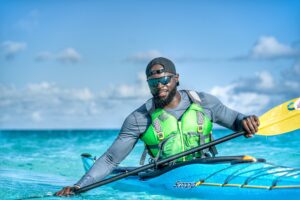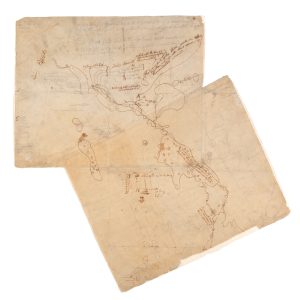
People & Culture
Kahkiihtwaam ee-pee-kiiweehtataahk: Bringing it back home again
The story of how a critically endangered Indigenous language can be saved
- 6310 words
- 26 minutes
People & Culture
The eco-explorer discusses his new role with the Society and the importance of sustainable travel

From an early age, Mario Rigby was taught that sustainability was an important practice. In the small German village of approximately 3,000 where Rigby grew up, each child was given the chance to select a toy from a box of used toys. These toys were passed down from child to child. The children would take care of the toy they had chosen so that, when they were finished with it, it could go back into the box to be passed along. Being raised with this circular, sustainable way of using products has inspired Rigby to share his message of sustainability far and wide.
“My message is to explore the world in ways that encourage you to become even more curious and explore even more but also to do it in a sustainable way,” says Rigby. “To me, to be an Explorer-in-Residence is essentially becoming the face of an organization that prides itself on exploration, research and discovery. There are so many possibilities with this opportunity, and I am excited to try out any one of them.”

Following the Royal Canadian Geographical Society’s mandate of making Canada better known to Canadians, the Explorer-in-Residence program aims to provide Canadians with visible modern-day role models in the fields of exploration, scientific discovery and adventure travel in Canada. Explorers-in-Residence also develop programs and carry out fieldwork supported by the Society. Rigby’s fellow Explorers-in-Residence are Jill Heinerth, George Kourounis, Adam Shoalts, Ray Zahab, Emily Choy and Mylène Paquette.
Rigby was born in Turks and Caicos and moved to Stuttgart, Germany, around the age of one, where he lived for 10 years before returning to the Caribbean. He moved to Toronto, where he currently resides when he was 16. For most of his life, his ultimate goal was to compete in the 200-and 400-metre races in the Olympics, but an unfortunate injury left him unable to compete at that level. Rigby became a personal trainer but soon realized the job was not something that left him fulfilled. He wanted to think bigger picture and have a wider influence. o me, exploration was exactly that. I think it requires precision to be able to get to certain places, it requires research and a team, and it requires a lot of effort in order to do something big.”
For nearly two decades, Rigby has been pushing boundaries as an adventurer and explorer, all while finding ways to give back. In 2015, he embarked on a two-year journey across Africa, walking and kayaking from Cape Town, South Africa, to Cairo, Egypt, with the mission to encourage people to be brave and explore the world. In the years since, Rigby has kayaked the length of Lake Ontario, spent 89 days cycling from Canada’s east to west coast, traversed the Turks and Caicos islands using only human-powered propulsion and more. “You can go to places, discover things and explore places in ways that no one else has ever done,” he says. “You can be a textbook example of how we can move forward with humanity.”

Curiosity inspires Rigby to continue exploring. “I think I just love the beauty of nature. I love humanity — the way we solve problems together. We are full of potential, and I think I’m in love with the potentiality of what humanity has to offer,” he says. With the Earth’s population projected to rise to 12 billion by 2100, Rigby says sustainability must be at the heart of how we move forward as a species. “As explorers, as athletes, we have to lead the way, and we have to show an example of how that’s possible. And so I like to do things in a sustainable way, the most extreme possible way.”
In his day-to-day life, Rigby practices sustainable travel by paying attention to the “small things”: how he packs his food, prepares for adventures and preplans. He also often questions whether or not he needs to go to certain places. “Just your footprint alone could damage the ecosystem,” he says. Although Rigby has an electric vehicle, he says he tries to use it as little as possible and often opts for public transportation. “I don’t think electric cars are necessarily the answer,” he says. “It’s essentially a mascot.”
Within Canada, Rigby says he hopes that rapid transportation will soon connect the east and west coasts — something similar to a bullet train or Elon Musk’s Hyperloop. He’d also like to see solar and wind power better utilized. “For instance, having my Tesla plugged into a supercharger would be great if that supercharger was connected to solar panels or wind.”

While out on the trails, Rigby often notices people using products that don’t degrade over time — items like plastic utensils and tableware. He says that building biodegradable, compostable materials is also key to making our lives more sustainable.
As someone constantly on the move, Rigby is always working towards his next adventure. In November 2023, he will traverse the Bahama Islands from the southernmost point to the northernmost point on his Lucayan Trail Expedition. Using purely human-powered and sustainable energy sources such as kayaking, swimming, running and hiking, Rigby will move across the islands while raising funds for underprivileged and marginalized communities. The goal, he says, is to help teach the people he meets along the way about marine life and also emphasize the importance of learning how to swim. “We’re putting money into these charitable organizations because we believe that a country that has people that don’t know how to swim, especially on an island, can’t be self-sustaining.”
Project EVA (Electric Vehicle Africa) is an expedition Rigby is lining up for 2024. This adventure will see him circumnavigating all of Africa using purely electric vehicles.
Closer to home, Rigby will be camping around Canada and promoting his adventures on social media to show his audience how to camp and hike more sustainably.
With his new title as Explorer-in-Residence, Rigby says he feels a responsibility to push the envelope even further. “It makes you feel like you have a higher duty, and I think it will encourage me to do more and hopefully allow for more support.”
Are you passionate about Canadian geography?
You can support Canadian Geographic in 3 ways:

People & Culture
The story of how a critically endangered Indigenous language can be saved

People & Culture
Remembering Louie Kamookak, a new Explorer-in-Residence and other highlights from the 89th Annual College of Fellows Dinner

People & Culture
L’écoexplorateur discute de son nouveau rôle au sein de la Société et de l’importance du tourisme durable

People & Culture
*It means “awake” in Beothuk, the language and people who once called present-day Newfoundland home for about 2,000 years. One young woman, believed to be the last living Beothuk, left a collection of maps and art that help us understand her people’s story.